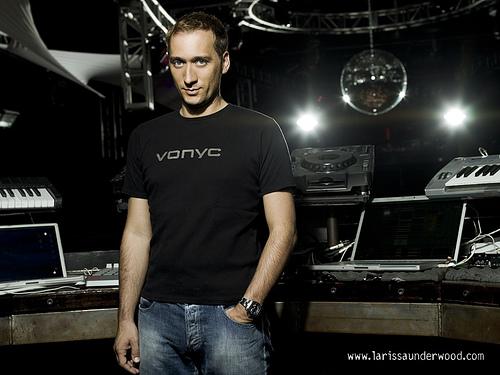Hey, I’m fine, thanks.
Yes, we arrived about 30, 40 minutes ago. We played in Atlanta and we just came in from London where we did the Identity Festival to start the tour, and Creamfields, because of the weather, of course, was cancelled.
Well, the thing is, obviously, you know, especially in the summer, the Ibiza season and the festival season comes all together with a long and crazy touring schedule, so, therefore, it’s a bit hectic but it’s all fun.
Well, the good thing is that I -- you know, I don’t know if you’re familiar with the set-up that I use when I’m playing -- but I have pretty much like a mini-studio on stage with computers and uh, a couple of mixes, keyboards, all sorts of stuff, and so when this is not on stage it’s obviously in my hotel room or wherever I am, so I can always make music, which is good, and then of course, as soon as I’m back, you know, I start producing it properly in the studio.
Not necessarily the music you’re playing, but rather the stage show.
Well, the thing is, you know, we’ve acquired this dynamic stage show for like the big festivals, for the evolution run, which is not actually possible to actually bring to the clubs -- it requires a mix of set-up and setting, that was developed together with the people that also did the last Muse tour, they also were also doing the closing ceremony for the Olympic Games and stuff like that, the TPO guys. And when we have that on the run it’s a bit of a difference in presentation, because the whole visual aspect of all of it actually comes to it as well. But in terms of the whole music thing, it’s just dynamic.
Well, the thing is, you know I kind of differentiate things because, the thing is, in the US there has always been a very very strong scene that’s promoted electronic music. I remember, you know, big shows in LA, like thousands of people in the mid-'90s already, so it’s not really in need of that big Top 40 explosion that we see. The thing is, it came really close to popular, like Top 40, like club music that has a danceable structure to it, but it doesn’t necessarily mean that it’s really electronic music and a lot of the people that actually follow that music, they don’t even know that house music originated in Detroit and Chicago. So, it’s like it’s a very sort of different perspective on things that I have here. The explosion that we see is not really an explosion of electronic music -- it’s basically normal pop music sounding danceable.
Well, the thing is, it’s like, I’m in a very fortunate position that’s like, you know, mainly because I’m around for such a long time, you know, that what they get, you know -- the numbers haven’t been going down or up. It’s been strong as always and I’m very happy about that. Of course, I just did the Identity Festival, played a few shows there, and the audience was different than that the one that we’d typically find in the clubs, and it’s still like we’re seeing that real electronic music can cross over and it doesn’t necessarily need to be the overcheesed la-la on top. It’s something that sort of gives me a lot of hope.
I think one of the reasons why these festivals are so popular is, obviously that these kids, they cannot go into the clubs, they cannot experience the music in the environment where it is comfortable. To them, it is a completely new thing, and as you said, they don’t even care that much about the music. If punk were the in thing right now, they would be going to punk concerts. It’s just like they’re popular music right now. This is why I made the differentiation between the electronic music scene in America going very strong -- like, I remember, I’m playing Boston since... I don’t know how many years. Always a great show, always a fantastic show, and you know, it’s not gonna change because Rihanna sounds danceable.
I’m sure it will. As I said, when I played the Identity Festival show, there was some music there that I was kind of like “Oh, right.” It’s not really the electronic music that I would call electronic music, but I say, my kind of stuff, I go out to the clubs and people get like you know, they enjoyed it. I think it is about, as well, taking on the responsibility of the DJ, and showing the young generation what our electronic music is and what our music is all about, because this is something that obviously some of the younger DJs, they don’t really understand that there is a host of fields to their music, and this is why the music is in a certain way.
Well, the thing is, it’s really clear. In fact, the responsibility that we have as a record company is to advertise the releases of our artists. And of course we have media partners all over the world that we’re actually structure our release and with another example, yes. We booked advertising, in DJ Mag and other magazines and online and wherever. Again, this is the responsibility of a record label. And, the business world apparently was shown that we had done the un-smart thing and was actually brought up in a very sort of weird scenario which is obviously complete nonsense. Again, all I can say is the responsibility of us as a record company is putting advertising out, and if people actually look very closely, even this guy, he’s done a very bad job. If you look very closely, it’s not me whose wiring money, it’s the basically label manager of Vandit Records who’s wiring money for an advertising campaign that’s going to be out, featuring the whole UK tour, featuring shows of Giuseppe Ottaviani, featuring shows of Gary Proud, featuring upcoming releases on Vandit Records. And, you know, it’s seriously nonsense that somebody who wants to be important, and this guy will be stopped by the right forces from what I heard.
Well, the thing is, it’s a team effort, to be honest. Musically, I don’t make any compromises. The thing is, the music I make, I’m the authentic artist presenting that music. When I DJ, I have a very clear idea about the music I like to play, and everything else that is actually happening is down to the interaction with my audience. That’s been something that has always been very important to me. The order of everything else, it’s always a team effort, because I’m involved with so many things, I’m lucky enough that I can do so many things, I couldn’t do it all on my own. I have a fantastic team that I work with, I have fantastic people within my team, you know, I rely on their expertise and their advice more than on, you know, my own decision-making sometimes.
Yeah, well, sometimes it is a bit difficult, you know. Of course it’s like especially in the position of being a label owner as well and all that. Sometimes you need to act on the base of being a manager of something, at the same time you are the product, at the same time you are the artist, at the same time you are a person. So sometimes it’s like kind of, uh, maybe schizophrenic.
Well, the thing is, I just finished doing a remix for Linkin Park, and we are in a very, sort of like, creative conversation to move on. I have to say, my musical influences are less in a crossover direction, and I’m not really so much influenced by R&B and hip-hop because, in a way, it’s the complete antidote of electronic music. Electronic music is about, like, bounce together, listening to our music, letting lose. The hip-hop we see, seen over the last 15 years is more about bling-bling and showing off.









.png)
.png)



